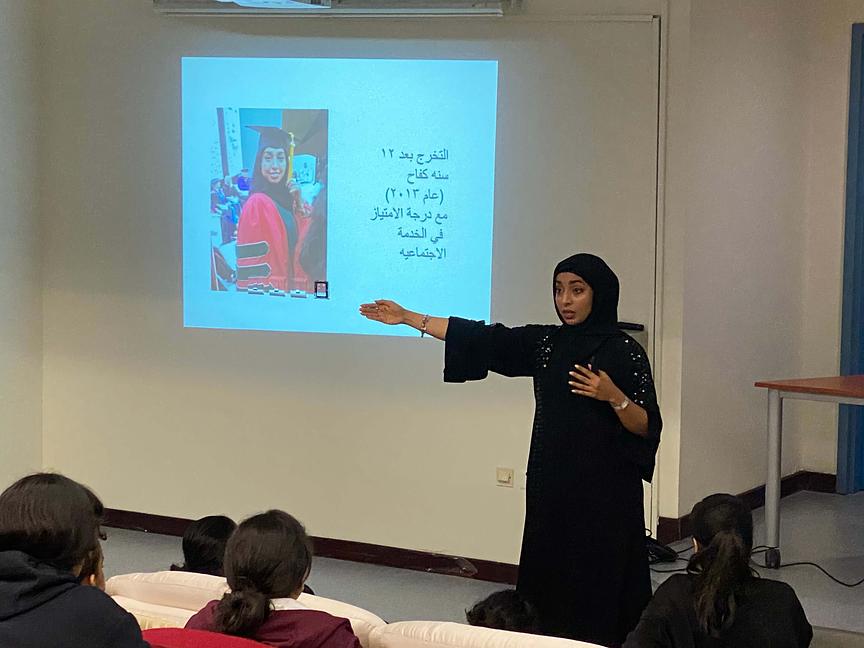What is the problem we are addressing?
Qatar allocates around 10% of its total expenditure for the education sector, but Qatari students’ performance in international tests placed them at the bottom of the test scores globally. Simply, students lack the motivation to excel in their studies. The way this problem has been addressed was never by tying it to student vision. We, on the other hand, wanted to enable students to make connections between scholastic performance and future education/ career success, so we came up with My Role Model Program.
We realized students are not only unaware of career paths they can pursue, but they also lack local female role models who could inspire and motivate them. We also focused on making our students realize they can do anything as women despite the social expectations or norms.
What is our solution?
My Role Model invites phenomenal Qatari women working in different positions to talk to students about their careers, struggles and success stories. In coordination with the school, we host one session every 2 weeks for one hour each, giving the students at the end the chance to ask questions. At the end of the program which runs for 6 months, we run a contest between students who attended the sessions. Students participate in the contest by preparing presentations for around 10 minutes about a job of their choice. They are evaluated based on their creativity and presentation skills. Students’ parents are welcome to attend the presentations and offer support, too. We chose 3 winning presentations at the end and took the students on a trip to a local university to show them the different programs they offer.
My Role Model motivates students to develop their own visions, corrects student behavior by pushing them beyond the classroom and encourages students to think about their future paths by exposing them to local role models.
An overview of our impact
We invited a number of women, one of which is Jawaher Al Qahtani, a Qatari surgeon, who fought for 12 years to become a surgeon. She shared with our students her journey of becoming a surgeon, the struggles she went through and what kept her moving forward. By the end of her talk, students were thrilled, kept asking questions and it was hard convincing them to go back to class. In their feedback, they said these talks have raised their awareness of the choices they have in the future and made them think more often about their career paths. These talks also increased student's belief that hard work pays off. In addition, they said it boosted their confidence and made them more hopeful and looking forward to the future.
We also invited a chemical engineer, research assistant and PhD holder, Dhabia Al Mohannadi, to discuss what chemical engineering is and why she pursued this career. She also talked about how important it was for her to excel in her studies to get to where she is now. Students afterwards discussed the importance of focusing on their studies to be able to pursue certain careers. By the end of the program, there was a noticeable increase in students' GPA in STEM subjects.
Examples of implementation
- We invited Jawaher Al Qahtani, a Qatari surgeon, who fought for 12 years to become a surgeon. She shared with our students her journey of becoming a surgeon, the struggles she went through and what kept her moving forward.
- We also invited a chemical engineer, research assistant and PhD holder, Dhabia Al Mohannadi, to discuss what chemical engineering is and why she pursued this career. She also talked about how important it was for her to excel in her studies to get to where she is now.
- We also hosted talks by a filmmaker and a pilot and other women in leadership positions.
What are our future goals?
We shared our idea with other schools through a video that shows what we have done. We also shared the contact information of the women we hosted in our school with the schools willing to implement the program. We are also thinking of starting a blog and publishing our students’ articles. In these articles, our students talked about the impact this program had on them and the questions and discussions they had with themselves, classmates or family.We are also thinking about setting up an app to connect students in Qatar with mentors to offer them help and guidance.
How can someone else implement it? What do they need?
All you need is speakers (in our case, women), students and a place to host both and it could work online as well.


